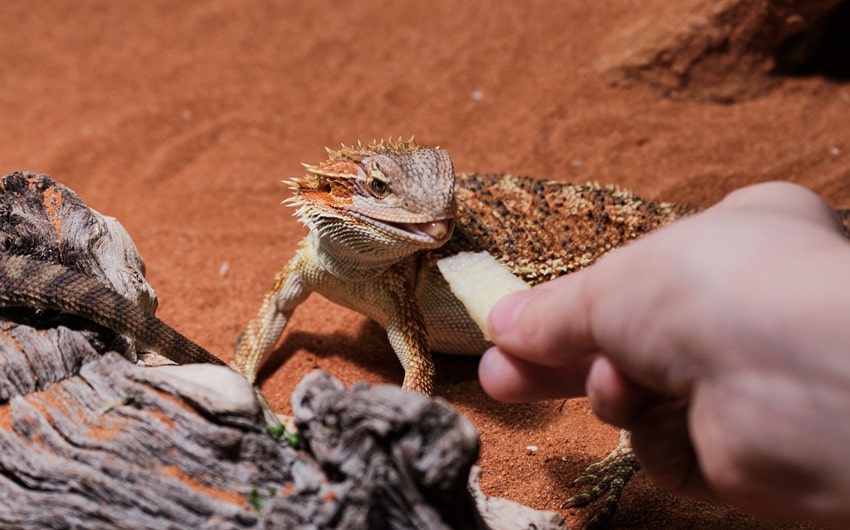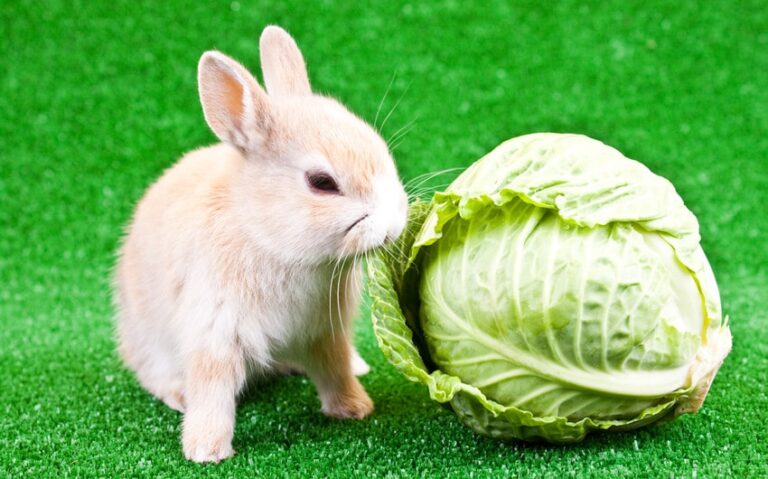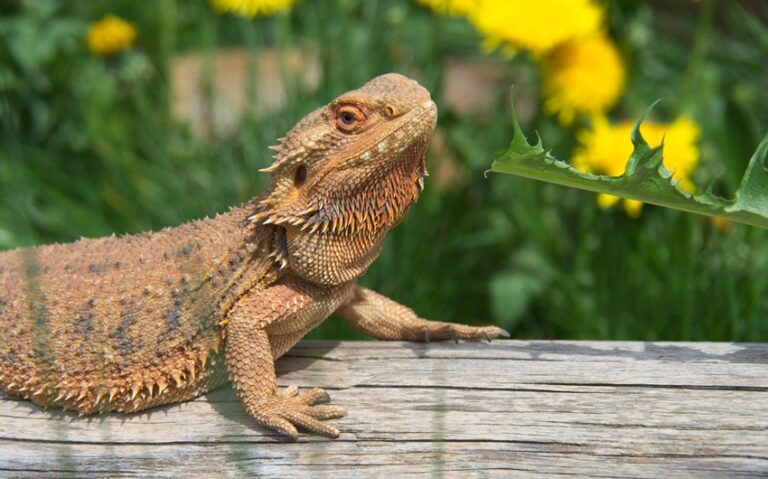What Fruits Can Bearded Dragons Eat? Guide to Safe Feeding
Bearded dragons are wonderful pets, known for their calm nature and curious personalities. If you’re a bearded dragon owner, you probably want to make sure your pet gets the right food to stay healthy. Along with vegetables and insects, fruits can be a tasty treat for them in moderation.
So, what fruits can bearded dragons eat? They can enjoy a variety of fruits like apples, berries, mango, and melons, but it’s important to avoid citrus and other harmful options. In this article, we’ll explore which fruits are safe and how to include them in your dragon’s diet.
Fruits Bearded Dragons Can Eat
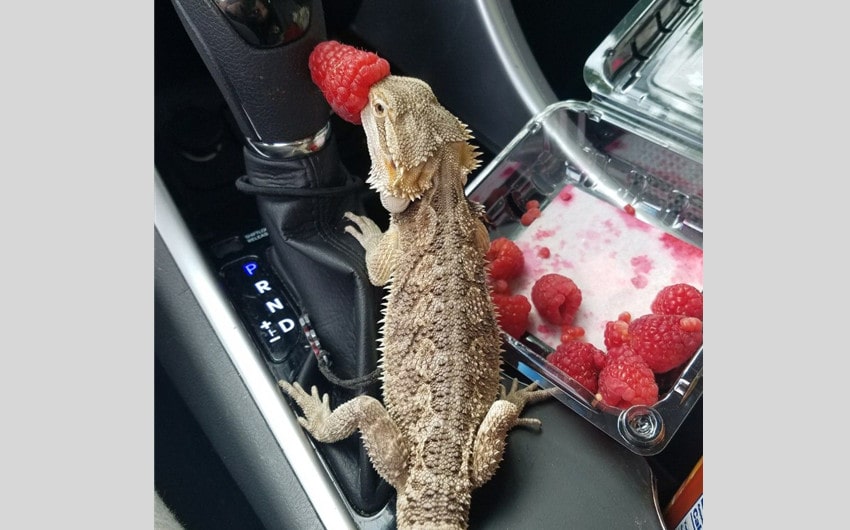
Image source: Pinterest
When feeding fruits to your bearded dragon, it’s important to choose ones that provide nutritional benefits while keeping their sugar intake in check. Here’s a more detailed look at the fruits bearded dragons can eat safely, along with some of their benefits and preparation tips:
1. Apples
Apples are a crunchy and hydrating fruit that many bearded dragons enjoy. They are packed with fiber, which aids digestion, and vitamin C, which helps boost immunity. However, apples should be served in moderation because of their sugar content. Always peel the apple, remove the core, and ensure there are no seeds, as they contain cyanide compounds that can be harmful to your dragon.
Cutting the apple into small, bite-sized pieces ensures that your pet can eat it safely without choking. Apples make a great occasional treat, offering both nutrition and hydration.
2. Berries (Strawberries, Blueberries, Blackberries, Raspberries)
Berries are a colorful and nutrient-dense option for bearded dragons. They are rich in antioxidants, vitamins C and K, and fiber, which all contribute to a healthy digestive system and strong immunity. The high water content in berries also helps keep your dragon hydrated, especially in warmer climates.
Be sure to wash them thoroughly to remove any pesticides. You can serve berries whole or chop them into smaller pieces, depending on the size of your dragon. Due to their sweetness, offer berries sparingly to avoid overloading your dragon’s diet with sugar. A handful of fresh berries is a fun, healthy treat that your bearded dragon will love.
3. Mango
Mango is a tropical fruit that provides a rich source of vitamin A, which is essential for a bearded dragon’s eye health and immune system. The soft, sweet flesh of the mango is easy for dragons to chew, but because of its high sugar content, it should only be offered occasionally.
To prepare mango, peel the skin, remove the large pit, and cut the fruit into small chunks. Mango’s bright color and juicy texture can add variety to your dragon’s diet, but moderation is key to preventing weight gain or digestive issues.
4. Papaya
Papaya is another tropical fruit that bearded dragons can enjoy. It is full of beneficial enzymes that aid digestion, as well as vitamins A and C for overall health. Its soft texture makes it easy for bearded dragons to eat. To serve papaya, remove the seeds and peel, then cut the fruit into small, manageable pieces.
Papaya is a nutritious option that can also provide hydration due to its high water content. However, because of its natural sugars, it should only be offered as an occasional treat. It’s a great fruit to add variety while keeping your dragon’s diet balanced.
5. Melons (Cantaloupe, Honeydew, Watermelon)
Melons, such as cantaloupe, honeydew, and watermelon, are fantastic hydrating fruits for bearded dragons. These fruits are high in water content and also provide vitamins A and C, which are important for maintaining good health. When serving melons, be sure to remove the tough rind and any seeds, as they can be difficult for your dragon to digest.
Cut the fruit into small cubes to make it easier to eat. While melons are refreshing and hydrating, they also contain a lot of sugar, so they should be fed sparingly. Offering melons occasionally will add some variety and hydration to your dragon’s diet without overwhelming them with too much sugar.
6. Figs
Figs are an excellent choice for bearded dragons because they are packed with calcium, a nutrient that is essential for healthy bones. They also contain fiber, which helps support digestive health. Figs can be served fresh or dried, but if you choose dried figs, make sure they do not have any added sugars or preservatives.
Because figs are sweet and dense, they should only be given in small amounts. They make a nutritious, calcium-rich treat, but too much can cause digestive issues due to their sugar content.
7. Pears
Pears are another fruit that bearded dragons can eat, providing hydration and fiber, which aids in digestion. Before offering pears, make sure to remove the skin, core, and seeds, as they can be difficult for your dragon to process. Slice the pear into small, manageable pieces to ensure they can chew it properly.
Pears are a mild fruit, which makes them easy on your dragon’s digestive system, but like most fruits, they should only be offered occasionally because of their sugar content. Pears provide a refreshing and hydrating treat that your bearded dragon will enjoy.
8. Peaches
Peaches are a sweet and soft fruit that bearded dragons can enjoy in moderation. They are a good source of vitamins A and C, which promote healthy skin, eyesight, and immune function. Be sure to remove the pit, as it can be dangerous, and peel the skin to make the fruit easier to digest.
Cut the peach into small pieces before serving. Due to their sweetness, peaches should only be fed occasionally, but they provide a delicious and nutritious treat that can add some variety to your dragon’s diet.
9. Grapes
Grapes are a simple and easy-to-prepare fruit for bearded dragons, but they should be fed with caution. Their small size makes them a potential choking hazard, so always cut grapes in half and remove any seeds before offering them to your dragon. Grapes are high in antioxidants and hydration, but they also contain a lot of sugar, which means they should only be given occasionally.
Despite their natural sweetness, grapes are a healthy, refreshing treat that can be part of a well-rounded diet when fed in moderation.
10. Kiwi
Kiwi is a nutrient-dense fruit that provides vitamins C and K, as well as fiber, which helps with digestion. It’s a flavorful option for bearded dragons, but it should be served sparingly due to its acidity and sugar content. Peel the skin and cut the kiwi into small, bite-sized pieces before offering it to your dragon. While kiwi can offer a variety of nutrients, its high acidity means it should only be an occasional treat to avoid digestive upset.
11. Plums
Plums are a soft and juicy fruit that bearded dragons can eat in small amounts. They provide a good source of fiber and vitamin C, but they are also high in sugar. Be sure to remove the pit and peel the skin before cutting the plum into small, bite-sized pieces for your dragon to enjoy. Like other fruits, plums should only be offered occasionally, but they can make a refreshing and hydrating snack when given in moderation.
12. Apricots
Apricots are a nutrient-rich fruit, particularly high in vitamin A, which is essential for eye health and immune function in bearded dragons. Always remove the pit and peel the skin before offering apricots to your pet. Cut the fruit into small pieces to make it easy for your dragon to eat. While apricots are healthy, their sugar content means they should be an occasional treat, not a staple food. Offering apricots in moderation can provide your dragon with a tasty, vitamin-packed snack.
13. Cherries
Cherries are another fruit that bearded dragons can eat, but they must be prepared carefully. Always remove the pits, as they are toxic, and cut the cherries into small pieces before serving. Cherries are rich in antioxidants and vitamins, making them a nutritious treat, but they are also high in sugar, so they should only be given occasionally. Their sweet taste and vibrant color make cherries an appealing treat, but moderation is essential to prevent digestive issues.
14. Pomegranate Seeds
Pomegranate seeds are a healthy treat for bearded dragons in small quantities. They are packed with antioxidants and vitamin C, which support immune health. However, because pomegranate seeds can be acidic, they should be offered sparingly to avoid stomach upset. Remove the seeds from the fruit and offer only a few at a time as part of a varied diet.
15. Guava
Guava is a tropical fruit that is high in vitamin A and C, making it beneficial for your bearded dragon’s health. Always peel the guava and remove the seeds before serving. Cut the fruit into small chunks to ensure your dragon can eat it safely. While guava is highly nutritious, it is also high in sugar, so it should only be offered occasionally as a special treat.
16. Cranberries
Cranberries are a great fruit to offer your bearded dragon occasionally. They are high in antioxidants and can be beneficial for urinary health. Fresh cranberries are best, but dried cranberries can also be offered as long as they are free from added sugars. Cranberries can be a tart treat for your dragon, so they should be given in small amounts to avoid any digestive issues.
17. Mulberries
Mulberries are a nutrient-dense fruit that bearded dragons can enjoy. They are rich in antioxidants, vitamins, and fiber, making them a great occasional snack. Mulberries can be offered fresh or dried, but as with any fruit, they should be given in moderation to prevent overconsumption of sugar. Mulberries are a delicious and nutritious option that can add variety to your dragon’s diet.
18. Cactus Pear (Prickly Pear)
Cactus pear, also known as prickly pear, is a unique and hydrating fruit that bearded dragons can safely eat. It is high in water content and provides vitamins and fiber. Be sure to carefully remove the skin and spines before offering it to your dragon. Cut the flesh into small pieces for easy consumption. Cactus pear can be a refreshing addition to your dragon’s diet, but due to its sugar content, it should be offered in moderation.
19. Dragon Fruit
Dragon fruit is a colorful, hydrating fruit that bearded dragons can enjoy occasionally. It is rich in antioxidants, vitamins, and fiber. The bright flesh of dragon fruit is visually appealing to dragons and can be a fun treat for them. Be sure to remove the outer skin before cutting the fruit into small pieces. While dragon fruit is healthy, it should only be offered as an occasional snack due to its sugar content.
General Guidelines for Feeding Fruits to Bearded Dragons
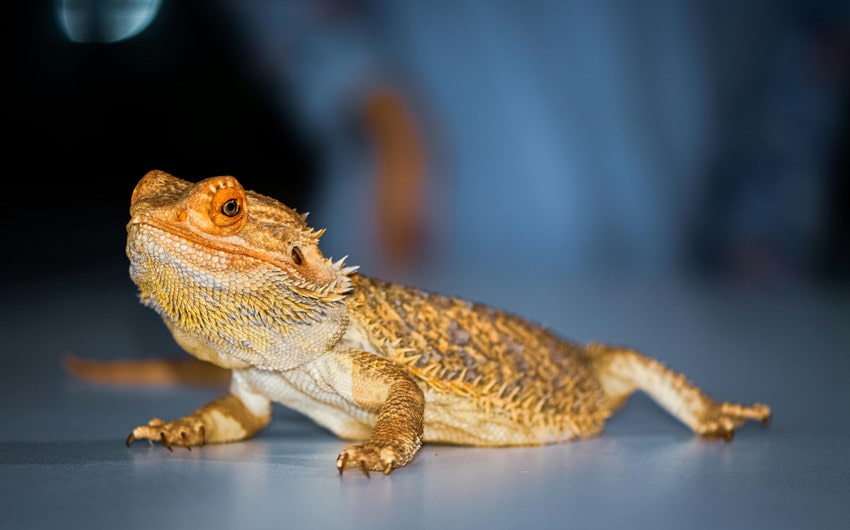
Fruits can be a fun and healthy addition to your bearded dragon’s diet, but there are a few important guidelines to follow to ensure their well-being. While fruits offer vitamins and hydration, they should only make up a small portion of your pet’s meals. Here’s how to safely incorporate fruits into their diet:
1. Fruits as Treats, Not a Staple
Bearded dragons need a diet that primarily consists of vegetables and insects. Fruits should make up only about 10-15% of their overall food intake. While they enjoy the sweetness and flavor, too much fruit can lead to health problems like obesity and digestive issues. Think of fruits as an occasional treat rather than a daily part of their meals.
2. Moderation is Key Due to Sugar Content
Fruits naturally contain sugars, which can be harmful if overfed. High sugar intake may cause imbalances in your bearded dragon’s diet, leading to obesity or tooth decay. Offering small portions and rotating between different fruits can keep the sugar levels in check and ensure a varied, balanced diet.
3. Balance with Vegetables and Insects
For optimal health, fruits should complement a diet primarily made up of leafy greens, vegetables, and protein-rich insects. The best meal plan for a bearded dragon is one that emphasizes dark leafy greens like kale and collard greens, along with live insects such as crickets and mealworms. Fruits should never replace these essential food groups but can enhance variety.
4. Consider the Nutritional Value
When choosing fruits for your bearded dragon, it’s important to focus on those that offer nutritional benefits. Fruits high in vitamins A and C, like papaya and berries, are good choices. These nutrients can boost their immune system and support overall health. However, some fruits, while safe to eat, don’t offer much nutritional value and should be fed sparingly.
5. Avoid Overripe or Rotten Fruits
Always check that the fruits you offer your bearded dragon are fresh. Overripe or rotten fruits can cause stomach upset or even lead to infections. Stick to firm, fresh fruits and make sure to cut them into small, manageable pieces to prevent choking.
6. Monitor for Any Adverse Reactions
Whenever you introduce a new type of fruit into your bearded dragon’s diet, monitor them closely. Look for any signs of digestive discomfort such as diarrhea or lack of appetite, which could indicate that the fruit isn’t agreeing with them. If this happens, remove that fruit from their diet and consult a veterinarian if needed.
7. Hydration and Water Intake
Fruits can provide a source of hydration due to their high water content, especially in dry climates or during hot weather. However, make sure fresh water is always available as fruits should not replace their regular water intake.
By following these general guidelines, you can safely introduce fruits into your bearded dragon’s diet, providing them with both nutrition and enjoyment while maintaining a healthy balance.
Fruits to Avoid
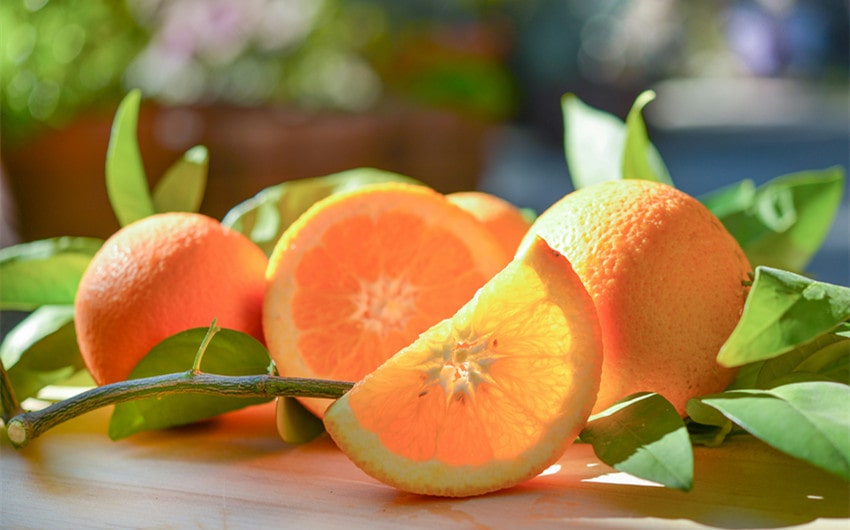
While bearded dragons can enjoy a variety of fruits in their diet, there are certain fruits that should be avoided due to their harmful effects or potential health risks. Some fruits contain toxic compounds, while others may have high levels of acidity or sugar, which can cause digestive issues or long-term health problems. Here are the fruits to avoid when feeding your bearded dragon:
1. Citrus Fruits (Oranges, Lemons, Limes)
Citrus fruits are a big no-no for bearded dragons due to their high acidity. The acidity in oranges, lemons, limes can cause stomach irritation, discomfort, and even diarrhea in bearded dragons. Additionally, the high sugar content in these fruits can lead to obesity and other metabolic issues.
While citrus fruits may seem appealing to humans, their acidic nature can disrupt a bearded dragon’s delicate digestive system, so it’s best to completely avoid them in their diet.
2. Avocado
Avocado is highly toxic to bearded dragons and should never be fed to them under any circumstances. Avocados contain a substance called persin, which is toxic to many animals, including bearded dragons. Even small amounts of avocado can cause vomiting, diarrhea, respiratory issues, and, in severe cases, death.
If your bearded dragon accidentally consumes avocado, it’s important to contact a veterinarian immediately. To avoid any risk, always ensure that avocados are kept away from your dragon’s food supply.
3. Rhubarb
Rhubarb is another fruit that poses a significant danger to bearded dragons. It contains oxalic acid, which binds with calcium in the body, preventing its absorption and leading to calcium deficiency. Calcium is crucial for bearded dragons to maintain healthy bones and prevent metabolic bone disease.
Rhubarb can also cause kidney problems and can be fatal if consumed in large quantities. Even though rhubarb is a common ingredient in human desserts, it should never be included in your bearded dragon’s diet.
4. Tomatoes (Especially Green or Unripe Tomatoes)
While small amounts of ripe tomato might not be immediately harmful, tomatoes are generally not recommended for bearded dragons due to their acidity. Unripe or green tomatoes are especially harmful because they contain solanine, a toxic compound that can cause digestive issues and poisoning.
Tomatoes can upset your dragon’s stomach, leading to diarrhea and dehydration. The occasional ripe tomato might not cause serious harm, but it’s better to steer clear of this fruit altogether to avoid any potential risks.
5. Star Fruit
Although star fruit is technically safe in small amounts, it is best avoided due to its high acidity. The acidic content can upset your bearded dragon’s stomach, leading to digestive discomfort or diarrhea. Star fruit also contains oxalates, which can interfere with calcium absorption, increasing the risk of metabolic bone disease. Since bearded dragons rely on calcium for strong bones and overall health, it’s better to eliminate star fruit from their diet to prevent any complications.
6. Persimmons
Persimmons, especially unripe ones, are not recommended for bearded dragons. Unripe persimmons contain high levels of tannins, which can cause digestive blockages or upset. Even when ripe, persimmons are very high in sugar, which can lead to obesity and metabolic issues in bearded dragons. Due to these factors, persimmons are best left out of your dragon’s diet.
7. Pineapple
Pineapple is another fruit that is very acidic and high in sugar, making it unsuitable for regular feeding. The acidity can cause irritation in a bearded dragon’s digestive tract, and the high sugar content can lead to weight gain and other metabolic issues. Pineapple should be avoided or only fed in very small, occasional portions to prevent digestive upset or other health problems. Always remove the skin and core if you do decide to offer a small amount.
8. Bananas
While bananas are not toxic to bearded dragons, they are very high in sugar and phosphorous, which can cause imbalances in calcium absorption. This can increase the risk of metabolic bone disease, especially if bananas are fed regularly. Bananas should only be offered very occasionally, if at all, and in very small amounts. The high sugar content can also lead to obesity and digestive issues, making bananas less ideal for regular feeding.
Preparation Tips for Feeding Fruits
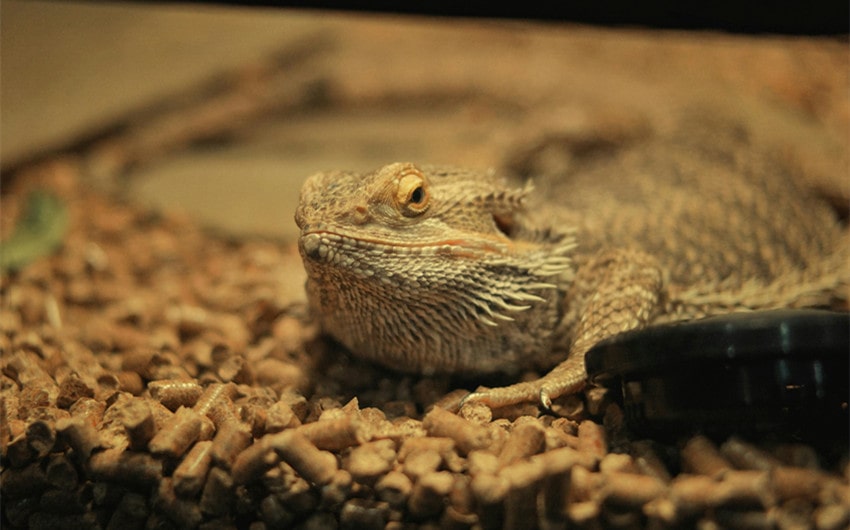
Feeding fruits to your bearded dragon can be a fun way to provide variety and nutrition in their diet, but it’s important to prepare the fruits properly to ensure their safety and health. Here are detailed tips on how to prepare fruits for your bearded dragon to enjoy:
1. Wash All Fruits Thoroughly
Before feeding any fruit to your bearded dragon, it’s essential to wash it thoroughly. Fruits, especially those bought from the store, often have pesticides, chemicals, or dirt on their skins that can be harmful to your pet. Use cool water and a gentle brush to scrub the skin of the fruit to remove any contaminants. Even if you plan to peel the fruit, it’s a good idea to wash it first to avoid transferring any residue from the skin to the flesh while cutting.
2. Peel the Skin When Necessary
For many fruits, the skin can be tough, difficult to digest, or even harmful to bearded dragons. Apples, peaches, pears, and mangoes should all be peeled before serving. Even though some fruit skins, like those of apples, may be safe for humans, they can be too fibrous for a bearded dragon’s digestive system, leading to blockages or discomfort. By peeling the fruit, you make it easier for your dragon to digest and enjoy the treat.
3. Remove Seeds, Pits, and Cores
Seeds and pits can pose serious choking hazards to bearded dragons and, in some cases, may even be toxic. For example, apple seeds contain trace amounts of cyanide, which can be harmful if ingested. Always remove the seeds from fruits like apples, grapes, and pears.
Similarly, large pits found in fruits like peaches, plums, cherries, and apricots must be removed before feeding. Be sure to also remove the core from fruits like apples and pears, as it can be difficult for your dragon to chew and digest.
4. Cut Fruits into Small, Bite-Sized Pieces
Bearded dragons have small mouths and cannot chew large chunks of food effectively. To prevent choking and ensure they can comfortably eat their food, always cut fruits into small, bite-sized pieces. The size of the pieces should be proportionate to the size of your dragon. A general rule is to make the pieces no larger than the space between their eyes. This makes it easier for them to pick up, chew, and digest the fruit.
5. Serve Fruits Fresh
Fruits should always be served fresh to your bearded dragon. Overripe, moldy, or spoiled fruits can cause digestive issues and may lead to more serious health problems like food poisoning. Check the fruit for any signs of spoilage before serving, and avoid giving fruits that are too soft or starting to ferment. Fresh, crisp fruits not only provide better nutrition but are also more appealing to your dragon.
6. Remove Uneaten Fruit Quickly
Bearded dragons may not eat all the fruit you offer, especially if they are more focused on insects or vegetables. It’s important to remove any uneaten fruit from their enclosure within a couple of hours to prevent it from rotting or attracting insects.
Decaying fruit can harbor bacteria or mold, which can make your bearded dragon sick if ingested. Additionally, leaving fruit in the enclosure can attract ants or flies, which could disturb your dragon or contaminate their living space.
7. Offer Fruits in Moderation
While preparing fruits is important, offering them in the right quantities is equally critical. Fruits should be a small part of your bearded dragon’s overall diet, typically making up around 10-15% of their food intake. Too much fruit, even when properly prepared, can cause digestive issues like diarrhea due to their high sugar and water content.
Offering fruits only as occasional treats ensures that your bearded dragon enjoys the variety while still maintaining a balanced diet of vegetables and insects.
8. Choose Organic When Possible
If you can, try to offer organic fruits to your bearded dragon. Organic fruits are grown without synthetic pesticides or chemicals, which reduces the risk of your dragon ingesting harmful substances. While washing can help remove surface residues, going organic ensures that the fruit is safer and healthier for your pet overall. Even with organic produce, though, it’s still important to wash the fruit thoroughly before serving.
9. Monitor Your Dragon’s Reaction to New Fruits
Every bearded dragon may react differently to various fruits. When introducing a new fruit, it’s a good idea to monitor your dragon for any signs of digestive discomfort, such as diarrhea, bloating, or a change in appetite. Start by offering a small portion and observe how they handle it.
If your dragon seems to enjoy the fruit and shows no adverse reactions, you can occasionally add it to their diet rotation. If any issues arise, stop offering that fruit and consult a veterinarian if symptoms persist.
10. Avoid Adding Sugar or Sweeteners
Bearded dragons do not need any extra sugars in their diet, so avoid adding sugar, honey, or other sweeteners to their fruits. Fruits already contain natural sugars, and adding more can lead to health problems like obesity, diabetes, or digestive issues. Stick to serving plain, natural fruits without any additives to ensure your dragon stays healthy and avoids excess sugar intake.
11. Mix Fruits with Vegetables
To encourage a balanced diet, you can mix fruits with vegetables when serving them. Bearded dragons need a variety of greens and veggies for proper nutrition, and adding a few small pieces of fruit can make their salad more appealing. Just be careful not to overload the dish with too much fruit. Mixing the fruit with greens like kale, collard greens, or dandelion leaves can ensure that your dragon gets a nutritious meal with a touch of sweetness.
Risks of Overfeeding Fruits
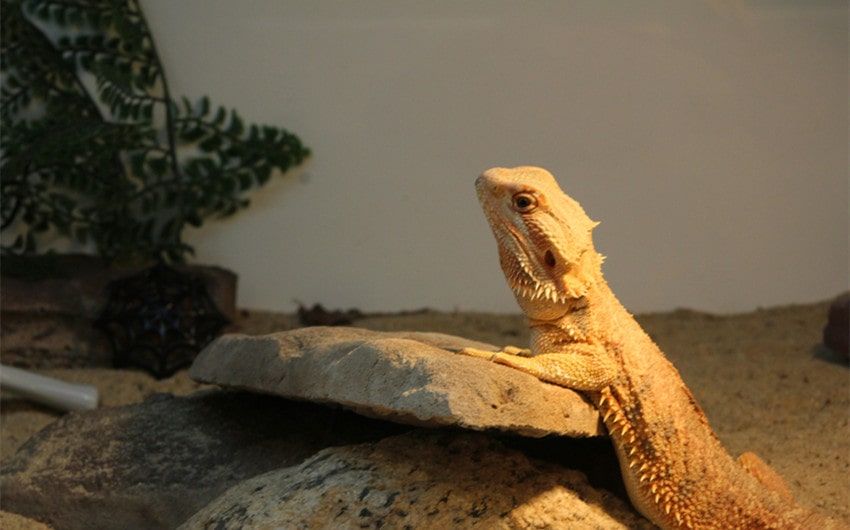
While fruits can provide valuable vitamins, hydration, and variety in a bearded dragon’s diet, overfeeding them can lead to serious health issues. Fruits are high in natural sugars and can cause imbalances in their diet when offered too frequently or in large amounts. Here are some of the key risks associated with overfeeding fruits to bearded dragons:
1. Excessive Sugar Intake
Fruits, although nutritious, contain much higher levels of sugar compared to vegetables and insects. Bearded dragons are not naturally adapted to process large amounts of sugar, and consuming too much of it can have negative effects on their health. High sugar intake can lead to a variety of problems, including:
- Obesity: Like humans, bearded dragons can gain excessive weight if they consume too much sugar. Obesity puts extra strain on their internal organs, reduces mobility, and can shorten their lifespan. It can also make them lethargic and less active, reducing their overall quality of life.
- Diabetes: In extreme cases, constant overfeeding of sugary fruits can contribute to insulin resistance, increasing the risk of diabetes in bearded dragons. Although diabetes in reptiles is rare, consistently high sugar intake can contribute to blood sugar imbalances, leading to long-term health issues.
- Digestive Problems: Too much sugar can cause digestive disturbances, including diarrhea. Fruits like berries, grapes, or melon are full of water and sugar, and when overfed, they can lead to loose stools or diarrhea, which can result in dehydration. Frequent diarrhea also reduces the efficiency of nutrient absorption, weakening your dragon’s overall health.
2. Imbalanced Diet and Nutrient Deficiency
A bearded dragon’s diet should primarily consist of leafy greens, vegetables, and protein-rich insects. When fruits are overfed, they take up space in your dragon’s diet that should be occupied by more nutrient-dense foods. Overfeeding fruits can lead to an imbalanced diet, which lacks the essential vitamins and minerals that bearded dragons need for optimal health.
- Calcium Deficiency: Fruits are generally low in calcium, and when they make up too much of a bearded dragon’s diet, this can lead to calcium deficiency. Calcium is crucial for strong bones and preventing metabolic bone disease (MBD), a common health issue in bearded dragons. If your dragon’s diet becomes skewed toward fruit, they may not get the necessary calcium to maintain bone health.
- Phosphorous Imbalance: Some fruits, such as bananas, contain higher levels of phosphorous, which can interfere with calcium absorption. When a dragon’s diet contains too much phosphorous and not enough calcium, it can lead to serious bone issues. This imbalance increases the risk of metabolic bone disease, a debilitating condition that can cause weakened bones, deformities, and even death if left untreated.
3. Digestive Issues
Bearded dragons have digestive systems that are more suited to a diet rich in plant-based fibers and proteins from insects. Fruits, especially those high in sugar and water content, can cause digestive upset when fed in excess. Common digestive issues caused by overfeeding fruits include:
- Diarrhea: Fruits like melons, strawberries, and grapes are very hydrating due to their high water content. While hydration is beneficial, too much fruit can lead to watery stools or diarrhea. Diarrhea can lead to dehydration, weakening your dragon’s health and reducing their energy levels. Chronic diarrhea can also hinder the absorption of vital nutrients, further compounding dietary imbalances.
- Bloating and Gas: Some fruits can ferment in a bearded dragon’s digestive system when consumed in large quantities, leading to bloating, gas, and discomfort. If your dragon shows signs of discomfort or bloating after eating fruits, it may be a signal that they are being overfed or their digestive system is struggling to process the food properly.
4. Tooth Decay
Just like in humans, excessive sugar intake in bearded dragons can contribute to tooth decay. Although reptiles have different types of teeth compared to mammals, high sugar levels in their diet can still lead to dental issues. Over time, frequent fruit consumption can cause plaque buildup, leading to gum disease, tooth decay, and difficulty eating.
A diet that is too rich in sugary fruits can significantly affect your dragon’s oral health and make it harder for them to chew properly.
5. Weakened Immune System
A diet too high in fruit, with less focus on vegetables and protein-rich foods, can weaken your bearded dragon’s immune system. Fruits are not rich in the full spectrum of vitamins and minerals necessary for a healthy immune system.
When bearded dragons are overfed fruits at the expense of more nutrient-dense vegetables and insects, they can become more susceptible to infections, illnesses, and general poor health. A weakened immune system also makes it harder for your dragon to recover from illness or injury.
6. Behavioral Changes
Overfeeding fruits, especially sugary ones, can lead to behavioral changes in bearded dragons. High sugar intake can cause fluctuations in energy levels. You may notice your dragon becoming overly energetic or restless after consuming too much fruit, followed by periods of lethargy or sluggishness once the sugar high wears off.
This kind of behavior is not typical of a healthy bearded dragon and can signal that their diet needs to be adjusted. Additionally, too many sugary treats can cause your dragon to become more selective or picky with their food, preferring sweet fruits over more nutritious greens and insects.
7. Risk of Dependency on Fruits
Bearded dragons can develop a preference for sweeter foods if overfed fruits regularly. If your bearded dragon gets accustomed to eating sugary fruits, they might begin to reject more essential parts of their diet, such as vegetables and insects. This can lead to long-term issues in ensuring your dragon is eating a balanced diet.
Once they develop a preference for sweet fruits, it may be difficult to reintroduce them to the vegetables and insects that they need for proper nutrition. It’s important to prevent them from developing this dependency by offering fruits sparingly and not making them a daily part of their diet.
8. Dehydration from Diarrhea
While fruits provide hydration, too much can have the opposite effect by causing diarrhea, which leads to dehydration. Diarrhea prevents proper water and nutrient absorption, leaving your dragon weak and lethargic.
If your dragon experiences frequent diarrhea due to overfeeding fruits, it could result in dehydration, a serious issue for reptiles that rely on a careful balance of hydration and diet. Chronic diarrhea can also lead to malnutrition, as the nutrients are not properly absorbed by the digestive system.

